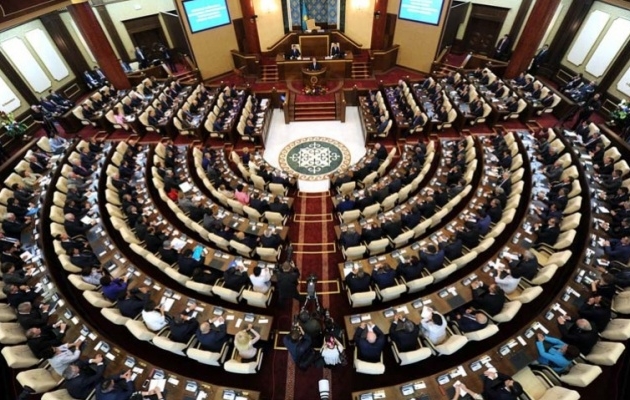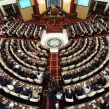
President Nazarbayev Announces Early Parliamentary Elections Amid Crisis
Publication: Eurasia Daily Monitor Volume: 13 Issue: 16
By:

On January 20, the official website of Kazakhstan’s presidency published Nursultan Nazarbayev’s address to the nation in which he announced snap parliamentary elections. Earlier, on January 13, the lower chamber of parliament, the Mazhilis, had made public a collective appeal to the head of state citing the need for a renewal of the legislature amid the economic crisis. “I perceive the initiative of the MPs as a manifestation of patriotism and, at the same time, concern about the future of our country. The organization of early elections to the Mazhilis and maslikhats [local legislative assemblies in the regions] will allow us to save both time and money,” the presidential statement reads. In accordance with article 51(3) of the Kazakhstani Constitution, once the parliament is dissolved, early elections ought to take place two months from the date of such dissolution—in this case, on March 20 (Akorda.kz, Tengrinews.kz, Kapital.kz, January 20).
The chairman of the Constitutional Council, Igor Rogov, with whom Nazarbayev had met with two days prior alongside the speakers of the Mazhilis and Senate as well as the Prime Minister, confirmed the president’s unrestrained right to dissolve the assembly at will. Early elections have become an undeclared ritual of sorts in Kazakhstan, with Nazarbayev himself having been reelected three times ahead of schedule: in 1999, 2011 and again in April 2015. In November 2011, the president had already dissolved the Mazhilis after receiving a similarly phrased letter from the MPs calling for the premature end of their mandate. The following January, the ruling NurOtan party, which had been the only political party in parliament since the previous elections of 2007, won in a landslide by gaining nearly 81 percent of the vote. It was joined by two pro-government parties: Ak Zhol and the Communist People’s Party of Kazakhstan (Kursiv.kz, January 18; Total.kz, April 28, 2015; Kapital.kz, April 22, 2015).
The possibility of snap elections has been actively debated since the middle of 2014 when Kazakhstan began to experience the impact of low oil prices on its export-driven economy. Yet, the more or less serious opposition to the Nazarbayev government remains structurally weak and will once again miss out on the opportunity to organize itself for Election Day. Therefore, the odds are small that NurOtan, whose monopoly is unlikely to be shattered, would have to tolerate outspoken critics in the next legislature. Both Ak Zhol and the communists are strongly in favor of an early vote, which they eagerly conveyed in the letter to Nazarbayev. The new parliament may potentially accept MPs from other parties, such as the National Patriotic Party Auyl (“village” in Kazakh). The latter is born out of a September 2015 merger between its predecessor of the same name and the Party of Patriots. Neither scored more than 2 percent in the 2012 parliamentary elections (Palata.kz, January 13; Panoramakz.com, September 11, 2015).
The real reason that the Nazarbayev administration has decided, once more, to stick with the known playbook is that the economic situation in Kazakhstan has grown considerably worse than in 2014 and particularly more so than in earlier periods. According to preliminary data, the Kazakhstani GDP grew by a modest 1.2 percent last year as compared with 4.3 percent in 2014 and 6 percent in 2013. Crude oil, which accounts for over 60 percent of Kazakhstan’s total exports and total government revenue, has fallen from an average of $105 a barrel in 2014 to less than $30 a barrel in January 2016, thus placing many oil exporters’ budgets under strain. During the 2000s when Kazakhstan started exporting its oil to the world market, the economy grew on average by more than 8 percent per year, reaching a high of 13.5 percent in 2001 (Worldbank.org, January 22; Forbes.kz, January 15; Nur.kz, January 27, 2015).
The unprecedented devaluation of the national currency, the tenge, which the government made floating last August, has been gnawing at the population’s buying power because of increased inflationary pressures. The 2015 realized inflation stands at 13.9 percent, the National Statistics Committee recently acknowledged, while the official mid-term target is capped at 8 percent. This is one percentage point lower than in neighboring Russia, although the ruble has been named one of the worst performing currencies in the world owing to its wild fluctuations since early 2014. The comparison between two core members of the Eurasian Economic Union (EEU) highlights not only the speed with which the tenge has lost much of its value, but also Kazakhstan’s dependence on imports—and the lop-sidedness of its oil-powered, undiversified economy (Stat.gov.kz, January 12; Interfax, December 31, 2015; Forbes.kz, August 20, 2015).
Renewing the parliament’s composition before the growth prospects deteriorate even further is most likely the principal cause of President Nazarbayev’s decision to cut short the Mazhilis’s current mandate, which should normally have expired in late 2016. The uncertainty is aggravated by the unresolved succession conundrum, as Nazarbayev is turning 76 in July and no successor has been designated thus far. To weather the crisis, Kazakhstan obviously needs strong leadership as well as unity and solidarity at a time when thousands of its citizens are witnessing breathtakingly speedy negative changes to their lifestyles. Yet, the biggest challenge the country is facing has all to do with diversification—and the sooner the better. Should the ongoing glut in the global oil market take a few more years to dissipate, Central Asia’s largest economy could pass up an historic opportunity to adjust its development model to the new economic reality.




